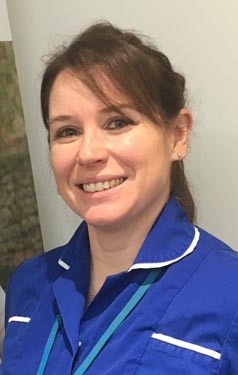How the pandemic has changed research at MKUH

Milton Keynes University Hospital research delivery has significantly changed since the start of the pandemic.
Louise Mew, a surgical research nurse at MKUH, has seen her own role change drastically over the past nine months.
Louise said: “When the inpatient admission rate began rising due to COVID-19, I was eager to help and contribute in whatever way I could.
“A lot of usual research activity was paused in March due to resources being required to focus on COVID-19 research and care. As expected, some of our team were redeployed to other areas and others, including myself, started working exclusively on the COVID-19 research trials.
“As a research nurse who usually has some background knowledge of the conditions the studies are focused on in her role, to suddenly have that focus shifted into an area which no one had experience in was incredibly frightening.
“New information surrounding COVID-19, and how to care for it, including treatments, infection control precautions and personal protective equipment guidelines, were being announced almost daily.
“I learned to rely on my colleagues like never before in terms of information and support. The research team became much more visual in MKUH than ever before, as we were approaching patients in wards and areas that we had previously not attended.”
Since the start of the pandemic, Louise has learned significantly as the hospital adapted its methods.
Louise said: “The pandemic has highlighted the importance of research in healthcare and the NHS in a way rarely seen before. Healthcare workers have pushed their boundaries and stepped out of their comfort zones daily in order to care for COVID-19 patients and the knowledge and experience gained in this respect has been invaluable in moving forward through this difficult period.
“Working on the COVID-19 research projects throughout the pandemic has provided me with skills and knowledge I would never have had the opportunity to develop otherwise.
“Inevitably, the pandemic has drastically changed the way we are delivering and managing research with the hospital environment. The traditional face-to-face method of approaching and recruiting patients to research studies has needed to be adapted and modified to limit person-to-person contact and prevent additional trips to the hospital or clinical settings.
“Many of the research trials I work on have brought out amendments considering this, including postal consent, verbal consent over the phone with witnesses or virtual electronic consent.
“One of my studies, FAME, is comparing surgery to wearing a cast in unstable ankle fractures for patients under 60. We were the first hospital to use virtual consent – where patients complete consent forms online – to recruit a participant for FAME. This means that the researcher and patient can complete the consent forms at any time prior to the operation and are not limited to the morning of admission where time can be short.”
Whilst the pandemic is clearly at the forefront of everybody’s minds, research in other areas is beginning to pick up.
Louise said: “COVID-19 research remains the priority, however, studies in other speciality areas have slowly started recruiting again. Despite COVID-19 admission rates rising again in October, many surgical studies remained open with the understanding that research activity in these areas may be reduced.
“I believe I am one of those lucky people who love their job. I am very passionate about the research projects I work on and firmly believe in their importance and value in developing treatments and healthcare.”
- MKUH is part of the NIHR Local Clinical Research Network for Thames Valley and South Midlands, covering MK, Buckinghamshire, Berkshire and Oxfordshire. It is hosted by Oxford University Hospitals NHS Foundation Trust. The network delivers research across 30 clinical specialities, covering the full breadth of clinical research areas. The overall network is made up of 15 networks which coordinate and support the delivery of research in the NHS and across the wider health and social care environment in England. The network makes research happen by providing funding, training and other support to local NHS providers, such as local hospitals and GP surgeries, as well as public health and social care to improve healthcare by running clinical research studies. It supports more than 500 staff, such as research nurses, to offer people the opportunity to take part in research. It also offers a comprehensive training programme for healthcare professionals who want to get involved with clinical research.
Last Modified: 3:32pm 18/12/2020
For all media enquiries please contact [email protected]
